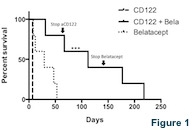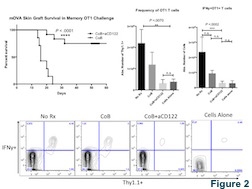Combined CD122 and Costimulation Blockade Prolongs Allograft Survival by Controlling Expansion and Effector Function of Memory CD8 T Cells.
1Emory Transplant Center, Emory University, Atlanta, GA
2JN Biosciences, Mountain View, CA.
Meeting: 2016 American Transplant Congress
Abstract number: 292
Keywords: Co-stimulation, Monoclonal antibodies, Primates, T cells
Session Information
Session Name: Concurrent Session: Challenges to Graft Survival and Tolerance: Animal Models
Session Type: Concurrent Session
Date: Monday, June 13, 2016
Session Time: 4:30pm-6:00pm
 Presentation Time: 4:54pm-5:06pm
Presentation Time: 4:54pm-5:06pm
Location: Room 306
CD8 memory T cells rely on signaling through CD122, the shared IL-2 and IL-15 receptor β-chain. The addition of anti-CD122 to costimulation blockade prolongs graft survival, in part by controlling costimulation independent memory CD8 T cell expansion and effector function. Twelve Rhesus macaques underwent bilateral nephrectomy and life-sustaining renal transplantation using a kidney from an MHC-mismatched donor. Animals were treated with belatacept monotherapy, anti-CD122 monotherapy, or anti-CD122 + belatacept. For murine studies, congenically labeled TCR transgenic OT1 cells specific for Ovalbumin peptide were adoptively transferred to naïve B6 mice, who were infected with ova expressing listeria monocytogenes. Thirty days post-infection mice were given ova expressing skin grafts. For functional studies, mice were sacrificed at day 5 post skin graft and OT1 cells from spleen and draining lymph node were analyzed via flow cytometry. Rhesus kidney transplant recipients receiving combined CD122 and costimulation blockade enjoyed long term survival (MST=112 days) compared to animals treated with Belatacept alone (MST=29).  In a murine model of memory CD8 T cell mediated rejection, combined CD122+costimulation blockade prolonged survival indefinitely (MST > 60 days) compared to costimulation blockade alone (MST = 20 days). Combined CD122 + costimulation blockade efficiently limits expansion and diminishes effector function of alloreactive CD8 memory T cells.
In a murine model of memory CD8 T cell mediated rejection, combined CD122+costimulation blockade prolonged survival indefinitely (MST > 60 days) compared to costimulation blockade alone (MST = 20 days). Combined CD122 + costimulation blockade efficiently limits expansion and diminishes effector function of alloreactive CD8 memory T cells.  The addition of therapies like anti-CD122 which target “costimulation-resistant” T cell subsets such memory T cells may allow for reduced rejection rates with belatacept-based therapy and encourage wider use in transplant recipients.
The addition of therapies like anti-CD122 which target “costimulation-resistant” T cell subsets such memory T cells may allow for reduced rejection rates with belatacept-based therapy and encourage wider use in transplant recipients.
CITATION INFORMATION: Mathews D, Dong Y, Higginbotham L, Kim S, Breeden C, Tso J, Adams A. Combined CD122 and Costimulation Blockade Prolongs Allograft Survival by Controlling Expansion and Effector Function of Memory CD8 T Cells. Am J Transplant. 2016;16 (suppl 3).
To cite this abstract in AMA style:
Mathews D, Dong Y, Higginbotham L, Kim S, Breeden C, Tso J, Adams A. Combined CD122 and Costimulation Blockade Prolongs Allograft Survival by Controlling Expansion and Effector Function of Memory CD8 T Cells. [abstract]. Am J Transplant. 2016; 16 (suppl 3). https://atcmeetingabstracts.com/abstract/combined-cd122-and-costimulation-blockade-prolongs-allograft-survival-by-controlling-expansion-and-effector-function-of-memory-cd8-t-cells/. Accessed July 3, 2025.« Back to 2016 American Transplant Congress
